Introduction: Exploring the Synergy Between Brain and Body
In the growing landscape of natural health solutions, few remedies have sparked as much scientific intrigue as nootropic mushrooms. These functional fungi, known for their powerful effects on brain function, are now gaining attention for another compelling benefit: their potential role in pain management. As researchers continue to explore the interplay between cognition and inflammation, one intriguing question arises: can mushrooms for pain relief offer a dual advantage, enhancing mental clarity while soothing physical discomfort? This article delves deeply into the science, tradition, and practical applications of nootropic mushrooms, uncovering their cognitive benefits and their surprising efficacy in managing various types of pain.
You may also like: The Ultimate Guide to the Best Nootropic Mushrooms for Memory and Cognitive Enhancement
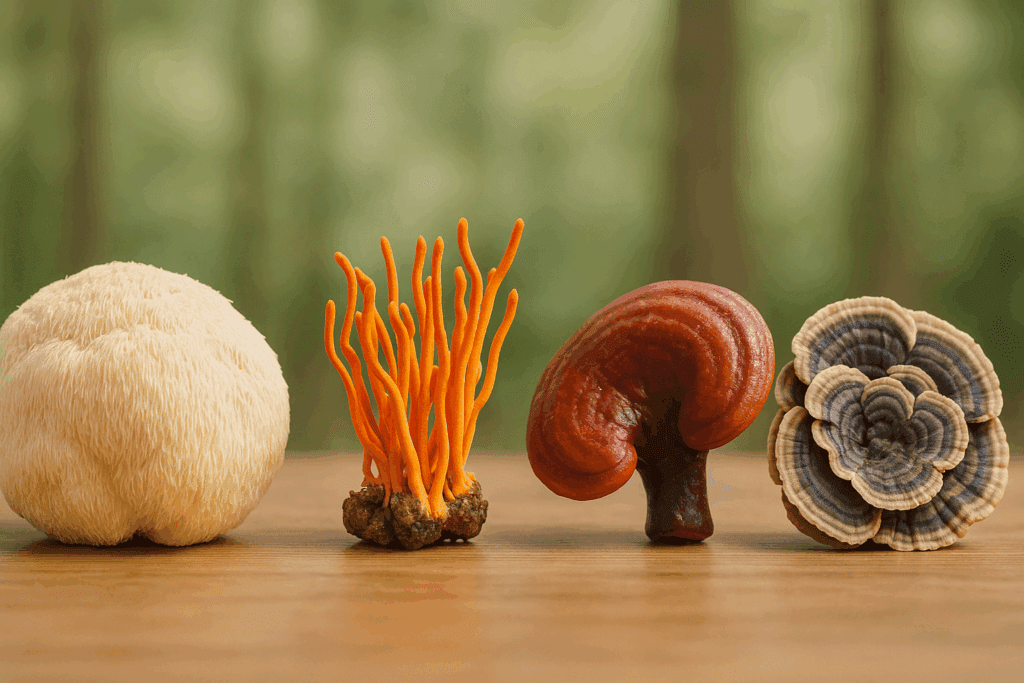
Nootropic Mushrooms: A Brief Overview of Cognitive Enhancers
Nootropic mushrooms are a unique category of fungi that support cognitive enhancement, neurogenesis, and mental clarity. Among the most well-known are Lion’s Mane (Hericium erinaceus), Cordyceps, Reishi, and Turkey Tail. These mushrooms contain bioactive compounds such as hericenones, erinacines, beta-glucans, and triterpenoids, which have been linked to improved memory, focus, and even emotional regulation. What sets nootropic mushrooms apart from other supplements is their dual functionality; not only do they enhance mental performance, but they also support immune health and reduce systemic inflammation.
Research into Lion’s Mane, for instance, shows promising evidence of its ability to stimulate nerve growth factor (NGF), a protein essential for the growth and survival of neurons. Cordyceps, traditionally used in Chinese medicine, has demonstrated fatigue-fighting capabilities and increased oxygen utilization, contributing to greater mental and physical stamina. When discussing cognitive longevity and peak mental performance, these fungi are often at the forefront due to their neuroprotective properties.
However, emerging studies are highlighting another dimension of these powerful mushrooms: their potential to reduce pain through mechanisms that also support brain health. By addressing both neural inflammation and systemic pain, nootropic mushrooms offer a holistic approach that aligns well with integrative medicine philosophies.
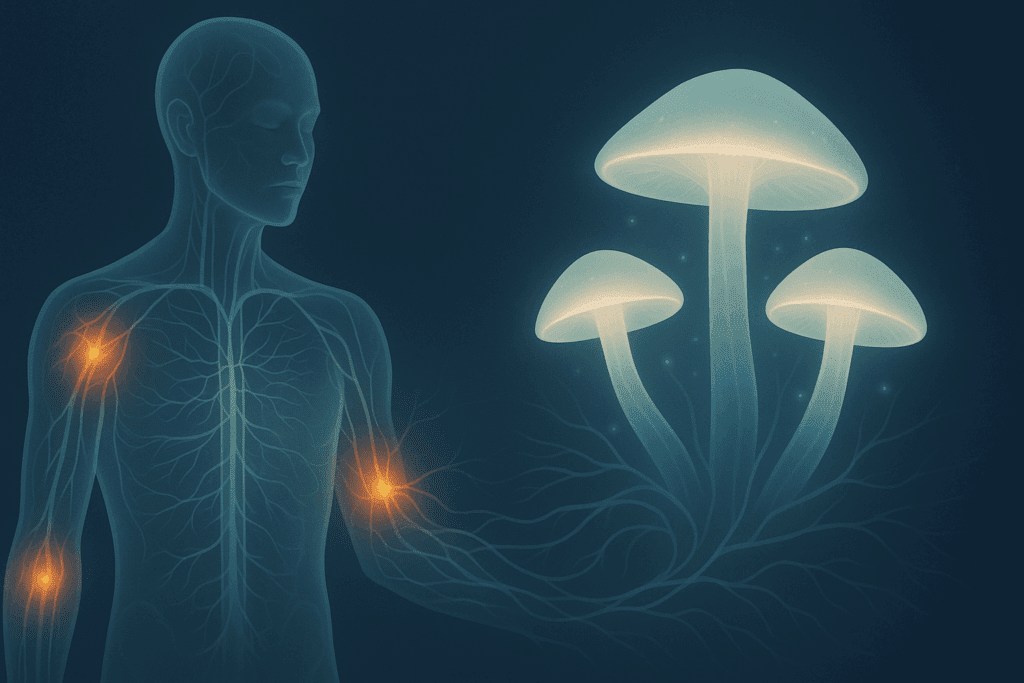
The Science Behind Mushrooms for Pain Relief
The idea that mushrooms for pain relief could become a staple in integrative health regimens is supported by growing evidence in the fields of neuroscience, immunology, and phytotherapy. Many nootropic mushrooms possess anti-inflammatory compounds that modulate the immune system, reducing the production of pro-inflammatory cytokines while promoting the release of anti-inflammatory agents. This modulation is essential for managing chronic pain conditions, particularly those rooted in inflammation, such as arthritis, fibromyalgia, and neuropathic pain.
Beta-glucans, found in mushrooms like Reishi and Turkey Tail, are polysaccharides that activate immune cells and regulate inflammatory pathways. This action not only helps with pain but also contributes to overall immune resilience. Similarly, triterpenoids in Reishi have demonstrated analgesic effects in animal models by inhibiting the COX-2 enzyme, a target of many conventional pain medications like NSAIDs. These findings suggest that certain mushrooms do help with pain through pathways that are both safe and effective, with fewer side effects than pharmaceutical counterparts.
In neurological conditions where pain and cognitive dysfunction coexist—such as multiple sclerosis or post-chemotherapy neuropathy—the neuroprotective and anti-inflammatory properties of mushrooms offer a dual-action solution. Thus, when people ask, “Are mushrooms anti inflammatory?” or “Do mushrooms help with pain?”—the answer increasingly appears to be yes, backed by a growing body of scientific literature.

Mushrooms for Pain and Inflammation: Addressing the Root Causes
To understand the full scope of mushrooms for pain and inflammation, it is essential to examine the root mechanisms driving chronic discomfort. Inflammation is a natural immune response, but when it becomes chronic, it can damage tissues, nerves, and even disrupt neurotransmitter function. Many pain-related conditions, including joint disorders, headaches, and autoimmune diseases, have an inflammatory component.
Nootropic mushrooms like Lion’s Mane not only promote cognitive clarity but also reduce neuroinflammation, which is a critical factor in both pain and cognitive decline. In animal studies, Lion’s Mane has been shown to reduce inflammatory markers in the brain and peripheral nervous system, suggesting a role in mitigating both physical and emotional pain. This makes it particularly valuable for individuals experiencing pain-related anxiety or depression.
Reishi, often referred to as the “mushroom of immortality,” is rich in ganoderic acids, which have anti-inflammatory and anti-nociceptive properties. These compounds inhibit the release of histamines and reduce allergic responses, making Reishi an excellent choice for those suffering from inflammatory conditions of the respiratory tract or skin. Moreover, Reishi’s sedative effects can help improve sleep quality—an important factor in pain management and cognitive restoration.
Cordyceps adds another layer by enhancing ATP production and improving oxygen efficiency in cells. This not only combats fatigue but also supports tissue repair, which is essential for healing and reducing chronic inflammation. As a result, when considering the best mushroom for pain relief, many practitioners point to a combination of these species to address both the symptoms and root causes of pain and inflammation.
Neuroinflammation and the Pain-Cognition Link
Chronic pain is often accompanied by cognitive impairment, such as memory loss, brain fog, and mood disturbances. This overlap is not coincidental; both pain and cognition are influenced by inflammation in the central nervous system. The hippocampus, a brain region critical for memory and learning, is particularly susceptible to inflammatory damage. Consequently, addressing neuroinflammation becomes crucial not just for alleviating pain but also for preserving cognitive function.
The anti-inflammatory properties of nootropic mushrooms help to break this cycle. By reducing microglial activation—the immune cells of the brain—these fungi help prevent the cascade of neuroinflammatory responses that can impair cognition and exacerbate pain. This is why mushrooms and inflammation are now being discussed together in both scientific and clinical settings. The protective effects on brain cells not only support better thinking and memory but also contribute to emotional well-being, which is often compromised in those living with chronic pain.
Turkey Tail mushroom, in particular, has shown promise in supporting gut-brain health, which is increasingly recognized as central to both immune and cognitive regulation. By nurturing a healthy microbiome and reducing gut-derived inflammation, Turkey Tail may offer yet another pathway through which mushrooms for pain relief exert their effects.
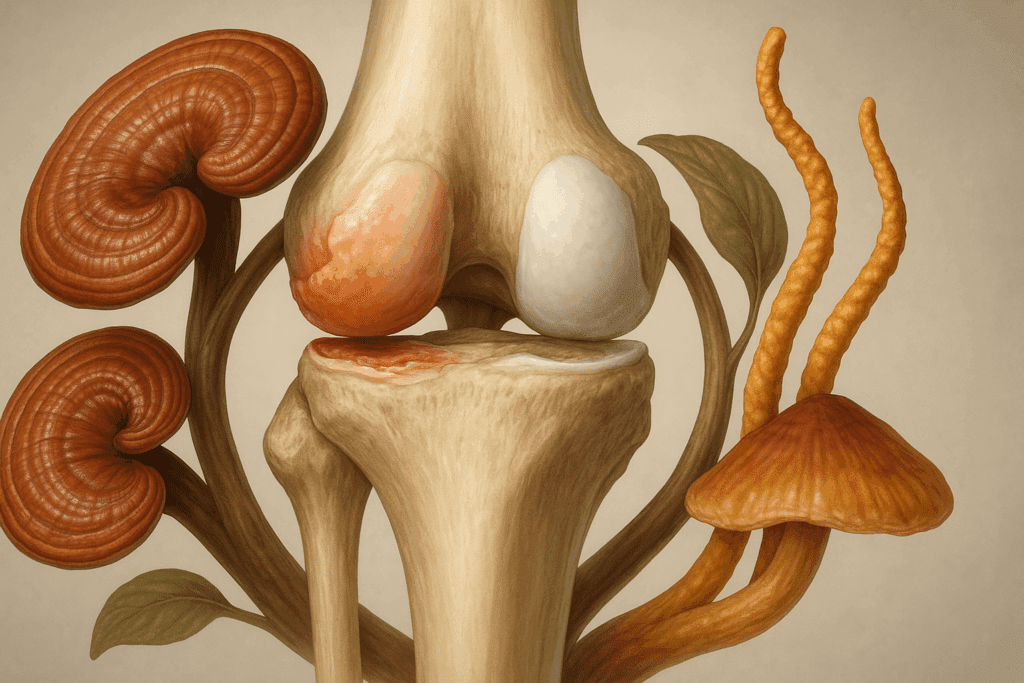
Mushrooms for Joint Pain: Rebuilding from the Inside Out
Joint pain is among the most common complaints in aging populations and active individuals alike. Whether stemming from osteoarthritis, autoimmune disorders, or sports injuries, joint pain can be debilitating and significantly impact quality of life. While conventional treatments often focus on symptom relief through anti-inflammatory drugs, nootropic mushrooms offer a more integrative approach.
Mushrooms for joint pain work by addressing both the inflammatory pathways and the tissue repair mechanisms involved in joint health. Reishi and Cordyceps, for instance, help reduce oxidative stress in joint tissues while modulating immune responses. This reduces the wear and tear on cartilage and connective tissues, promoting a longer-lasting sense of relief and mobility.
Moreover, many mushrooms contain ergothioneine, a powerful antioxidant that accumulates in high concentrations in tissues exposed to oxidative stress, such as joints. This compound protects against cellular damage and may support the regeneration of cartilage and synovial fluid. As such, when discussing whether mushrooms are good for inflammation, the evidence is increasingly pointing toward a positive correlation—especially in relation to joint health.
Clinical anecdotes and small-scale trials have shown that regular use of mushroom extracts can improve range of motion, reduce swelling, and decrease reliance on NSAIDs in individuals with chronic joint conditions. This positions nootropic mushrooms as a compelling alternative or complementary therapy for those managing joint pain with a long-term, holistic mindset.
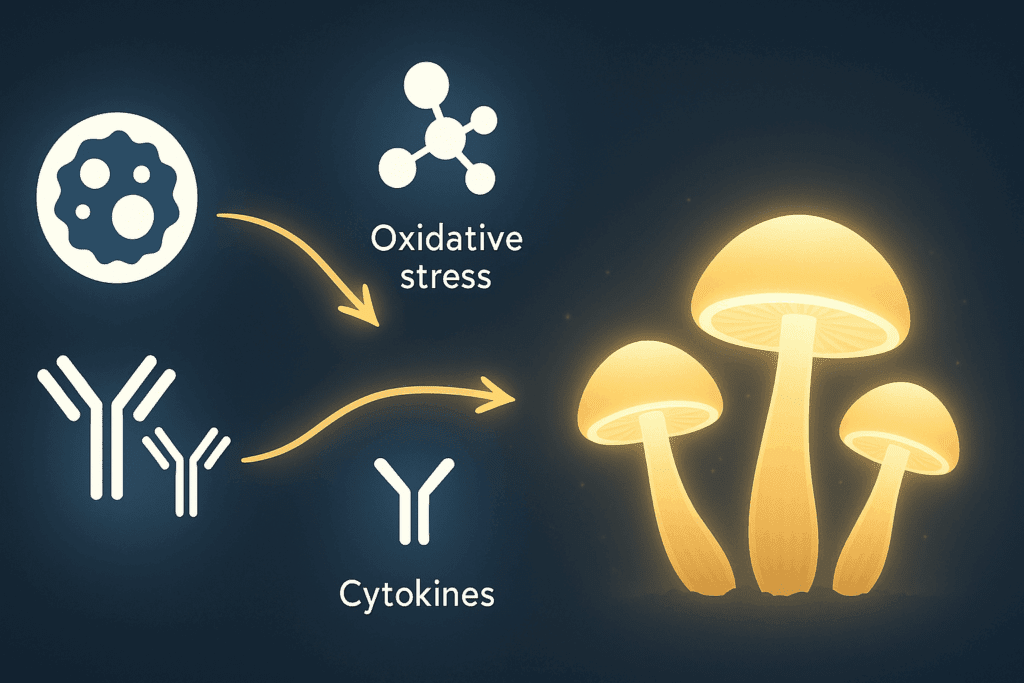
Unlocking the Mechanisms: Do Mushrooms Help with Inflammation?
At the molecular level, the question “do mushrooms help with inflammation?” can be explored through the lens of cytokine regulation, oxidative stress response, and cellular repair. Most nootropic mushrooms exert their anti-inflammatory effects by influencing cytokine signaling pathways such as NF-kB and MAPK, which are responsible for initiating inflammatory responses in the body. By modulating these pathways, mushrooms reduce the release of pro-inflammatory cytokines like TNF-alpha, IL-1, and IL-6, while increasing the production of anti-inflammatory cytokines such as IL-10.
Another key mechanism is the enhancement of antioxidant defense systems, particularly through the activation of enzymes like superoxide dismutase (SOD) and glutathione peroxidase. These enzymes neutralize free radicals and reduce oxidative stress, which is closely linked to chronic inflammation and tissue damage. By fortifying the body’s own defense systems, mushrooms create an internal environment less conducive to inflammation and pain.
This is especially relevant in conditions like inflammatory bowel disease (IBD), rheumatoid arthritis, and chronic fatigue syndrome, where systemic inflammation underlies both pain and cognitive dysfunction. The ability of mushrooms to work on multiple biological fronts simultaneously—immune modulation, antioxidant activity, and neuroprotection—makes them uniquely equipped to handle complex, multifactorial conditions.
Given this evidence, it becomes clear that when people ask, “does mushrooms help with inflammation?” they are tapping into a question that science is increasingly prepared to answer with a resounding yes.
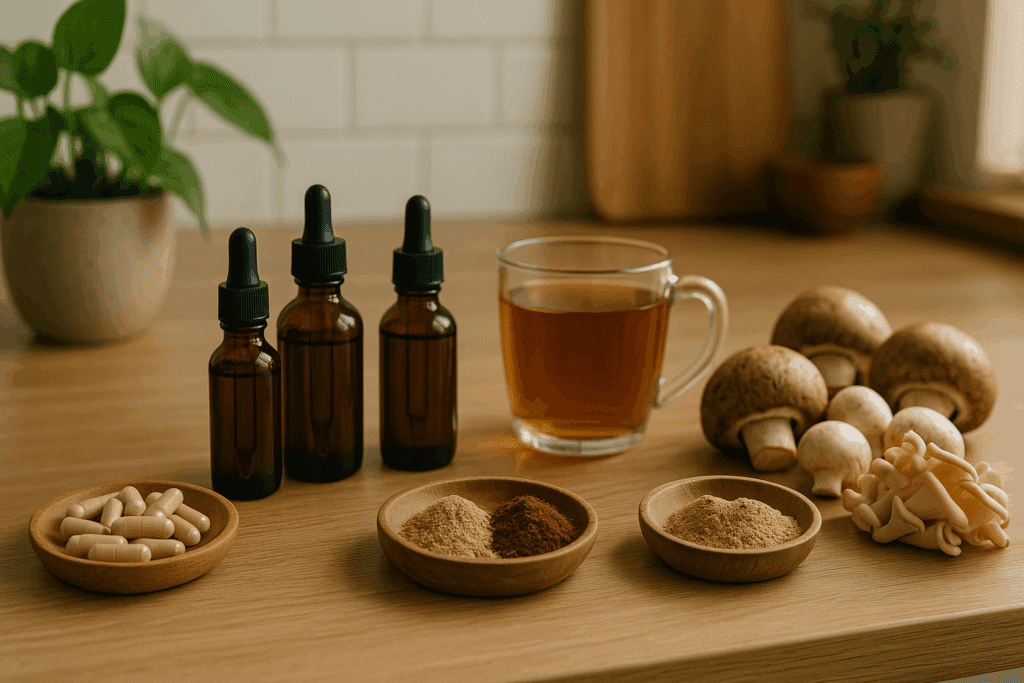
Integrating Mushrooms for Pain Relief into Daily Life
Incorporating mushrooms for pain relief into a daily wellness regimen can be both simple and effective, provided the approach is thoughtful and consistent. The most common forms of administration include capsules, tinctures, teas, and powdered extracts. Each format has its own advantages depending on the user’s needs and lifestyle. For instance, tinctures offer rapid absorption, while capsules provide convenience and consistent dosing.
The efficacy of mushroom supplements also depends on factors such as the extraction method, bioavailability, and whether the product contains fruiting bodies or mycelium. Fruiting bodies are often preferred for their higher concentration of active compounds. Double-extraction methods, which use both alcohol and hot water, are considered the gold standard for maximizing therapeutic potency.
For those seeking relief from chronic inflammation and cognitive fog, combining different mushroom species may yield synergistic benefits. A blend of Lion’s Mane, Reishi, and Cordyceps, for example, can address neuroinflammation, immune modulation, and energy metabolism in a comprehensive manner. In this way, users are not just managing symptoms but actively supporting the body’s natural healing processes.
Clinical consultation is always recommended, especially for individuals already taking medications or managing complex health conditions. While nootropic mushrooms are generally safe and well-tolerated, interactions with immunosuppressants or anticoagulants are possible. A healthcare provider can guide dosage and ensure compatibility with existing treatments, thereby maximizing the benefits of mushrooms for pain and inflammation.
The Best Mushroom for Pain Relief: Choosing with Purpose
With numerous options available, determining the best mushroom for pain relief depends on the individual’s unique symptoms, underlying conditions, and overall health goals. Lion’s Mane is particularly effective for those whose pain is accompanied by cognitive issues, such as brain fog or anxiety. Its dual action on neural repair and inflammation makes it a top choice for neurogenic pain and post-injury recovery.
Reishi, with its sedative and immune-balancing properties, is ideal for individuals dealing with autoimmune conditions, insomnia-related pain, or allergic inflammation. Cordyceps excels in enhancing endurance and oxygen uptake, making it suitable for fatigue-related pain and inflammatory conditions affecting the muscles and joints.
Turkey Tail is often favored for its gut-supportive and anticancer properties, which can be crucial for individuals recovering from treatments that cause pain and cognitive disruption. Ultimately, the best results often come from a personalized combination that aligns with the user’s physiology and health profile.
It’s important to choose high-quality, organic, and lab-tested mushroom supplements to ensure safety and efficacy. Look for certifications such as USDA Organic or third-party lab verification, which signal that the product meets stringent quality standards. This attention to quality reinforces the EEAT principles of trustworthiness and medical accuracy, ensuring that readers and users alike can make informed, responsible health decisions.
Expanding the Research Horizon: Clinical Trials and Human Studies
As the popularity of mushrooms for pain relief continues to grow, scientific interest is beginning to transition from preclinical models to well-structured clinical trials. Historically, much of the data supporting the use of nootropic mushrooms has come from in vitro experiments and animal studies, which, while promising, require confirmation in human subjects to ensure translational value. Fortunately, a wave of new research is addressing this gap, examining how these functional fungi perform in randomized controlled settings involving patients with conditions such as rheumatoid arthritis, chronic fatigue, and cognitive decline.
One noteworthy area of study is the effect of Lion’s Mane on individuals with mild cognitive impairment. In a double-blind, placebo-controlled trial conducted in Japan, participants taking Lion’s Mane powder daily for 16 weeks showed significantly improved cognitive function compared to the placebo group. Interestingly, some subjects also reported reductions in physical symptoms such as neuropathic tingling and joint stiffness, hinting at a link between cognitive improvement and decreased inflammation. These findings further validate the use of mushrooms for pain relief as part of a broader therapeutic strategy.
Other studies are focusing on Reishi’s ability to modulate immune function and reduce chronic pain symptoms in cancer patients undergoing chemotherapy. Patients reported not only improved sleep and reduced fatigue but also lower levels of pain and anxiety. While more robust data is still needed, these early trials underscore the multifaceted role these mushrooms can play in holistic healing. By examining dosage, bioavailability, and patient outcomes in a standardized manner, researchers are building a credible foundation for the integration of these fungi into mainstream medicine.
As the field matures, we can expect greater refinement in the identification of active compounds, delivery mechanisms, and therapeutic protocols. In this context, the question “does mushrooms help with pain?” is evolving from anecdotal evidence to evidence-based consensus, bridging the gap between traditional knowledge and contemporary clinical practice.

Personalized Approaches to Using Mushrooms for Pain Relief
One of the most exciting developments in the application of mushrooms for pain relief is the growing emphasis on personalized medicine. While generic supplements can offer benefits, tailoring the type, dose, and combination of mushrooms to the individual’s unique physiological profile can significantly enhance outcomes. This approach aligns with trends in functional medicine and integrative health, where personalization is key to achieving lasting results.
For example, individuals with autoimmune-driven pain, such as lupus or rheumatoid arthritis, may benefit more from immune-modulating species like Reishi and Turkey Tail. These mushrooms can help regulate immune overactivity, thereby reducing inflammation and tissue damage without compromising overall immune function. Conversely, those experiencing pain rooted in neurological issues—such as migraines or nerve damage—may respond better to Lion’s Mane due to its nerve-regenerative properties.
Practitioners are also beginning to consider factors such as circadian rhythm, gut microbiome health, and existing medication regimens when recommending mushroom supplements. For someone with disrupted sleep and pain-related fatigue, nighttime use of Reishi might provide calming, restorative benefits that indirectly reduce inflammation. On the other hand, an athlete recovering from overexertion may find Cordyceps particularly useful in the morning to boost energy, reduce muscular soreness, and speed recovery.
Technology is playing a growing role in facilitating this personalized approach. Wearable devices, health tracking apps, and genetic testing kits are now being used to monitor inflammation markers, sleep cycles, and cognitive performance. These tools enable a more nuanced understanding of how mushroom supplementation is impacting the body and allow for real-time adjustments to dosing and formulation. This evolving model of personalized mycotherapy represents a significant leap forward in holistic health care.
By embracing individual variation and integrating high-quality data into decision-making, practitioners and patients alike can optimize the benefits of mushrooms for pain and inflammation. The result is a more targeted, responsive, and ultimately effective approach to natural healing that reflects the complexity of the human body.
FAQ : Exploring Mushrooms for Prostate Cancer: Insights, Evidence, and Practical Applications
1. What emerging research supports the use of mushrooms for prostate cancer prevention or management?
Recent studies have explored how bioactive compounds in medicinal mushrooms, such as polysaccharopeptides and beta-glucans, interact with androgen receptors and cellular signaling pathways associated with prostate cancer progression. Specifically, researchers have found that Turkey Tail and other mushroom varieties may help regulate inflammatory markers and oxidative stress, which are linked to both cancer development and progression. Several preliminary clinical studies, especially those involving immune therapy co-treatment, have demonstrated enhanced immune surveillance and reduced tumor activity when mushrooms for prostate cancer are part of the treatment strategy. However, more large-scale, double-blind human trials are needed to confirm these effects. Integrative oncologists are increasingly recommending these mushrooms as adjuncts to conventional care due to their immune-modulating properties and safety profile.
2. How do mushrooms for prostate health differ from those used primarily for cognitive enhancement or general wellness?
Mushrooms for prostate health are typically selected based on their anti-inflammatory, anti-androgenic, and immune-supportive characteristics. While Lion’s Mane excels in cognitive regeneration, it is Turkey Tail, Reishi, and Maitake that are more commonly linked to urological wellness. These species influence the prostate by inhibiting certain pathways like 5-alpha reductase, which is implicated in benign prostatic hyperplasia (BPH) and possibly cancer. Additionally, they offer antioxidant protection to prostate tissue, helping to counteract the damage from environmental toxins and age-related oxidative stress. In contrast, nootropic mushrooms primarily target neurogenesis, mood stabilization, and memory enhancement through different molecular mechanisms.
3. What makes Turkey Tail mushroom and prostate cancer a particularly relevant area of study today?
The interest in Turkey Tail mushroom and prostate cancer has grown due to its rich content of polysaccharopeptide (PSP) and polysaccharide-K (PSK), which are believed to enhance immune function and inhibit tumor growth. PSP, in particular, has demonstrated the ability to activate dendritic cells and T-cells, both critical components of cancer immunosurveillance. While traditionally used in Japan and China for gastrointestinal cancers, recent attention has turned toward prostate health due to promising in vitro and in vivo models showing slowed proliferation of prostate cancer cells. Moreover, Turkey Tail’s ability to improve gut microbiota could have systemic effects, including reduced systemic inflammation, which indirectly supports prostate wellness. These properties make it an exciting candidate for further research and integration into oncological protocols.
4. Can mushrooms for prostate health be used alongside conventional therapies like hormone blockers or chemotherapy?
Yes, many practitioners now support the use of mushrooms for prostate health as complementary therapies to standard cancer treatments. For instance, certain mushrooms may reduce the severity of side effects such as fatigue, nausea, and lowered immunity caused by chemotherapy or hormone therapy. Some compounds found in mushrooms, such as triterpenes and flavonoids, may even enhance the sensitivity of cancer cells to radiation or drugs. It’s crucial, however, that patients work closely with a medical team experienced in integrative medicine to prevent possible interactions. Personalized approaches that balance natural and pharmaceutical treatments tend to yield the best outcomes while minimizing adverse effects.
5. Are there dietary or lifestyle practices that enhance the effects of mushrooms for prostate cancer?
Indeed, combining medicinal mushrooms with a prostate-healthy lifestyle can amplify their benefits. A diet rich in cruciferous vegetables, omega-3 fatty acids, and polyphenol-rich foods like berries and green tea can support anti-inflammatory pathways activated by mushrooms. Regular physical activity also enhances lymphatic flow and immune cell mobility, making the body more receptive to the immunomodulating effects of mushrooms. Stress management through mindfulness or yoga can further complement the adaptogenic properties of Reishi and Turkey Tail. Avoiding excessive alcohol, processed meats, and exposure to endocrine disruptors can also help protect the prostate. When integrated into a comprehensive wellness plan, mushrooms for prostate cancer can act as powerful allies.
6. How do mushrooms influence hormone regulation in men with prostate concerns?
Hormonal balance is crucial in maintaining prostate health, especially concerning testosterone and its more potent derivative, dihydrotestosterone (DHT). Certain mushrooms contain compounds that inhibit the 5-alpha reductase enzyme, which converts testosterone to DHT—a process associated with prostate enlargement and possibly cancer. Reishi and Maitake have shown promising results in modulating hormonal activity without causing systemic imbalances. Moreover, these mushrooms may also reduce the expression of estrogen receptors in prostate tissue, contributing to a more stable endocrine environment. This nuanced hormone regulation supports the therapeutic role of mushrooms for prostate health in both prevention and management contexts.
7. What role does the gut microbiome play in the effectiveness of mushrooms for prostate cancer?
The gut microbiome significantly influences systemic inflammation, immune function, and hormonal metabolism—all key factors in prostate health and cancer progression. Turkey Tail, in particular, is a known prebiotic mushroom that nourishes beneficial gut bacteria such as Bifidobacteria and Lactobacilli. A balanced microbiome improves the bioavailability and efficacy of mushroom-derived compounds while enhancing immune surveillance. Some researchers suggest that gut dysbiosis may correlate with increased prostate inflammation, making the microbiome a viable therapeutic target. Therefore, using mushrooms for prostate cancer alongside dietary probiotics and fiber can provide a synergistic benefit that extends beyond the gastrointestinal tract.
8. What does the future look like for using mushrooms as part of prostate cancer treatment plans?
The future of incorporating mushrooms into prostate cancer protocols is promising but contingent on rigorous scientific validation. Several research centers are currently running controlled trials to better understand dosing, bioavailability, and potential drug interactions. Advances in biotechnology, such as mushroom-derived nanomedicine and mycelium-based drug delivery systems, may soon enhance the specificity and potency of mushroom therapies. Consumer awareness and demand for natural adjuncts are also likely to fuel investment in high-quality, standardized mushroom extracts. As the evidence base strengthens, we can expect mushrooms for prostate cancer to become a more accepted part of personalized, integrative oncology.
9. Are there specific formulations or extraction methods that maximize the benefits of mushrooms for prostate health?
Yes, the extraction method and formulation greatly impact the therapeutic potential of medicinal mushrooms. Dual extraction—using both hot water and alcohol—ensures the capture of water-soluble beta-glucans and alcohol-soluble triterpenoids, maximizing the spectrum of benefits. Standardized extracts that guarantee minimum concentrations of active compounds offer more consistent and predictable outcomes. Additionally, encapsulated forms with bioenhancers such as black pepper extract can improve absorption. Fermented mushroom products are also gaining popularity for their enhanced bioavailability and probiotic support. These innovations make it easier for patients to reliably experience the benefits of mushrooms for prostate health.
10. What precautions should men take before using mushrooms for prostate cancer support?
While generally safe, it’s important for men to consult with a healthcare provider before incorporating medicinal mushrooms into their regimen—especially if they are undergoing treatment for prostate cancer. Some mushrooms can interact with anticoagulants or immunosuppressants, potentially altering treatment outcomes. It’s also essential to purchase high-quality, third-party tested supplements free from contaminants like heavy metals and pesticides. Patients should begin with small doses to monitor their response and avoid self-diagnosing or replacing conventional treatments with mushrooms. By taking a responsible, informed approach, men can safely explore the complementary role of mushrooms for prostate cancer management.
Conclusion: Embracing a Holistic Approach to Pain and Cognitive Wellness
The growing interest in mushrooms for pain relief reflects a broader shift in how we understand the intersection of mind and body. Nootropic mushrooms are not just cognitive enhancers; they are powerful allies in the fight against chronic pain and inflammation. Through their rich array of bioactive compounds, these fungi offer a unique approach to healing that bridges ancient wisdom and modern science.
By addressing the root causes of pain—neuroinflammation, oxidative stress, immune dysregulation—nootropic mushrooms provide a comprehensive strategy for long-term wellness. They empower individuals to take control of their health, not merely by masking symptoms but by supporting the body’s innate healing capacity. The synergy between cognitive enhancement and pain relief positions these mushrooms as essential tools in the evolving landscape of integrative medicine.
As we continue to uncover the full potential of functional fungi, one thing becomes clear: their role in health care is only beginning to unfold. Whether you’re seeking sharper focus, better memory, or lasting relief from chronic pain, nootropic mushrooms offer a natural, science-backed solution worth exploring.
In the final analysis, the journey into the world of nootropic mushrooms is both empowering and enlightening. It invites us to reconsider how we approach health and healing—not as isolated symptoms to suppress, but as interconnected systems to support. With their proven effects on both brain and body, mushrooms for pain relief stand as a testament to nature’s ability to nourish, protect, and restore our well-being from the inside out.
Further Reading :
Psilocybin as a novel treatment for chronic pain
Anti-inflammatory properties of edible mushrooms: A review
The 6 Types of Functional Mushrooms: Can They Improve Your Health?
